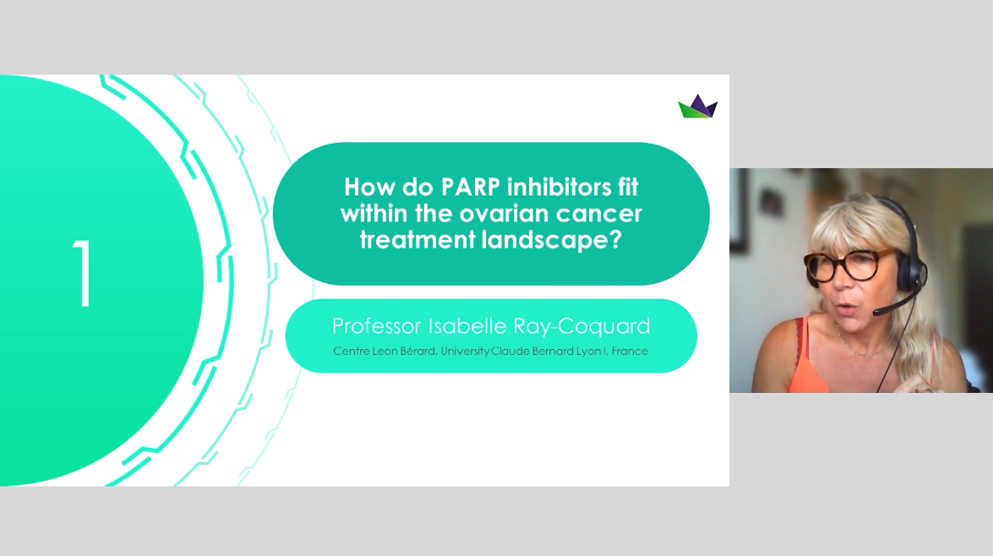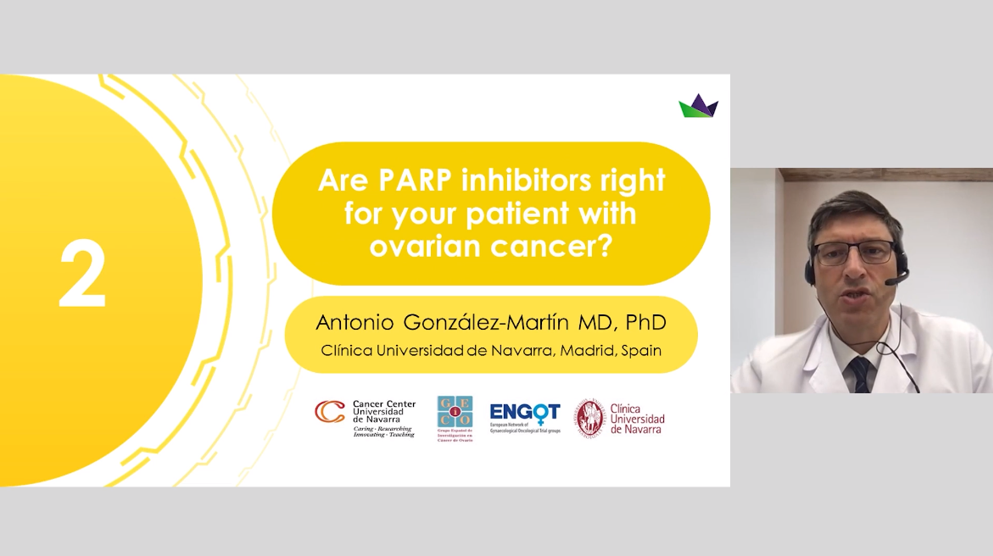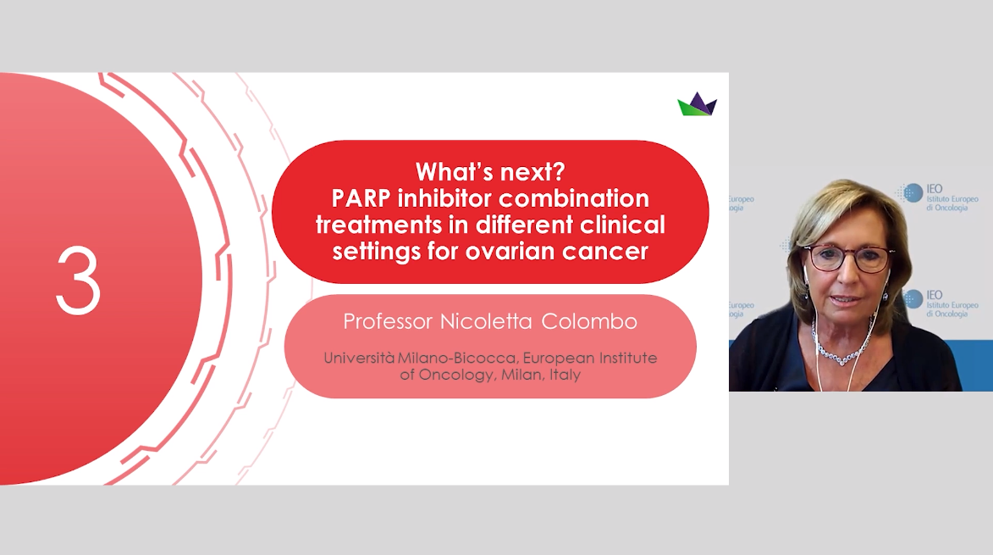
Webinar Highlights 2022
PARP inhibitors for ovarian cancer: current applications and what’s next
Gain practical insights into the latest evidence for the use of PARP inhibitors as a targeted treatment for ovarian cancer
The ‘PARP inhibitors for ovarian cancer: current applications and what’s next’ webinar reviews the place of PARP inhibitors within the ovarian cancer treatment landscape, highlighting differences in indication and efficacy, with a special focus on the emerging clinical trial evidence for the utility of PARP inhibitors in less well studied patient subgroups. Join our experts in the field of ovarian cancer, Professors Isabelle Ray-Coquard, Antonio Gonzalez-Martin and Nicoletta Colombo who will provide practical insights and key considerations for integrating PARP inhibitors into ovarian cancer clinical practice.
Webinar Highlights
In session 1, Professor Isabelle Ray-Coquard discusses the PARP inhibitors indicated for use in people with ovarian cancer, and how PARP inhibitor therapy interplays with traditional cancer treatments such as chemotherapy.
In session 2, Professor Antonio Gonzalez-Martin covers the types of patients and cancers that are suitable for PARP inhibitor therapy.
In session 3, Professor Nicoletta Colombo discusses the future of PARP inhibitor therapy, covering PARP inhibitor combination treatments and the types of patients this would benefit.
Join our panel of experts as they answer audience questions and cover important topics such as the need for more accurate biomarkers, efficacy of molecular assessment of BRCA status, how HRD status impacts PARP inhibitor use and more.
The webinar ‘PARP inhibitors for ovarian cancer: current applications and what’s next’ presented three clinically relevant topics related to the prescribing of PARP inhibitors as part of an ovarian cancer management plan:
Session 1: How do PARP inhibitors fit within the ovarian treatment landscape?
- Speaker: Professor Isabelle Ray-Coquard
Session 2: Are PARP inhibitors right for your patient with ovarian cancer?
- Speaker: Professor Antonio Gonzalez-Martin
Session 3: What’s next? PARP inhibitor combination treatments in different clinical settings for ovarian cancer
- Speaker: Professor Nicoletta Colombo
Session 4: Q&A and panel discussion
- Speakers: Professor Isabelle Ray-Coquard, Professor Antonio Gonzalez-Martin and Professor Nicoletta Colombo
Learn more about PARP inhibitors for ovarian cancer management
Meet the experts
Professor Isabelle Ray-Coquard
Professor Isabelle Ray-Coquard is Professor of medical oncology in University Claude Bernard Lyon I in France, medical oncologist in the regional Comprehensive Cancer Center at Centre Leon Bérard, and Network Director of the national observatory dedicated to rare ovarian cancer. In addition, Professor Ray-Coquard is President of the GINECO (Groupe d'Investigateurs Nationaux pour les Etudes des Cancers de l'Ovaire) group, and an active member of a number of professional groups, including the American Society of Clinical Oncology, the American Association for Cancer Research, the Connective Tissue Oncology Society, the French Society of Cancer, the European Association of Cancer Research, the EORTC (European Organisation for Research and Treatment of Cancer) organisation, the European Society of Medical Oncology, and the European Society of Gynaecological Oncology.
Disclosures
Receipt of grants/research supports: BMS, MSD, GSK, Astra Zeneca, Roche
Receipt of honoraria or consultation fees: BMS, MSD, GSK, Astra Zeneca, Roche, Agenus, Macrogenics, Deciphera, Mersana, Sutro, Askebio, Adapatimmune, Amgen, Novartis, Novocure, Esai, OncXerna, Pharmamar
Professor Antonio Gonzalez-Martin
Professor Antonio González-Martín is Director of the Cancer Centre Universidad de Navarra in Spain. He is also an associate professor of medicine at Francisco de Vitoria University in Madrid, Spain. Professor González-Martín specialises in the treatment of gynaecologic and breast cancer. He is the chairman of GEICO (Spanish group for investigation in ovarian and gynaecological cancer), the GEICO representative in ENGOT (European Network for Gynecological Oncological Trials), and one of the representatives of GEICO in the Gynecologic Cancer InterGroup. He also served as the chair of the ovarian cancer committee in GCIG for the period 2016-2020, and as the chairman of ENGOT for the period 2018-2020. In addition, Professor González-Martín is a member of the board of the Spanish Society of Medical Oncology (SEOM), and he is also Associate Editor of International Journal of Gynecological Cancer.
Disclosures
Receipt of grants/research supports: Roche, Tesaro/GSK
Receipt of honoraria or consultation fees: Roche, Tesaro/GSK, Clovis, Astra Zeneca, MSD, Genmab, Immunogen, Oncoinvent, Pfizer, EMD Serono, Amgen, Mersana, SOTIO, SUTRO, Macrogenics
Participation in a company sponsored speaker’s bureau: Roche, AstraZeneca, Tesaro/GSK, PharmaMar
Other support (travel, accommodation, expenses): Roche, AstraZeneca, PharmaMar, Tesaro/GSK
Professor Nicoletta Colombo
Professor Nicoletta Colombo is Associate Professor of Obstetrics and Gynecology at the University of Milan-Bicocca, Director of the Ovarian Cancer Centre at European Institute of Oncology (IEO), and Chair of the Program of Gynecology. Professor Colombo is also author of several publications in the field of gynaecologic oncology, and a member of various professional societies such as the American Society of Clinical Oncology (ASCO), the Society of Gynaecologic Oncologists (SGO) and the International Gynaecological Cancer Society (IGCS). She is also Past President of the European Society of Gynaecologic Oncology (ESGO) and Chaired the ESMO-ESGO-ESTRO Consensus Conference in endometrial cancer (2015), and the ESMO-ESGO Consensus Conference in ovarian Cancer (2018). She has been subject Editor of ESMO Clinical Guidelines for Gynecological Cancers from 2016 and 2020. In 2020 she received the IGCS life-time achievement award.
Disclosures
Receipt of grants/research supports: Roche, AstraZeneca
Receipt of honoraria or consultation fees: Roche, PharmaMar, AstraZeneca, Clovis Oncology, Merck Sharp and Dohme, GlaxoSmithKline, Tesaro, Pfizer, BioCad, Immunogen, Mersana, Eisai, Oncxema and Nuvation Bio Participation in a company sponsored speaker’s bureau: AstraZeneca, Tesaro, Novartis, Clovis Oncology, Merck Sharp and Dohme, GlaxoSmithKline and Eisai
This content has been developed independently by Medthority who previously received educational funding in order to help provide its healthcare professional members with access to the highest quality medical and scientific information, education and associated relevant content.




